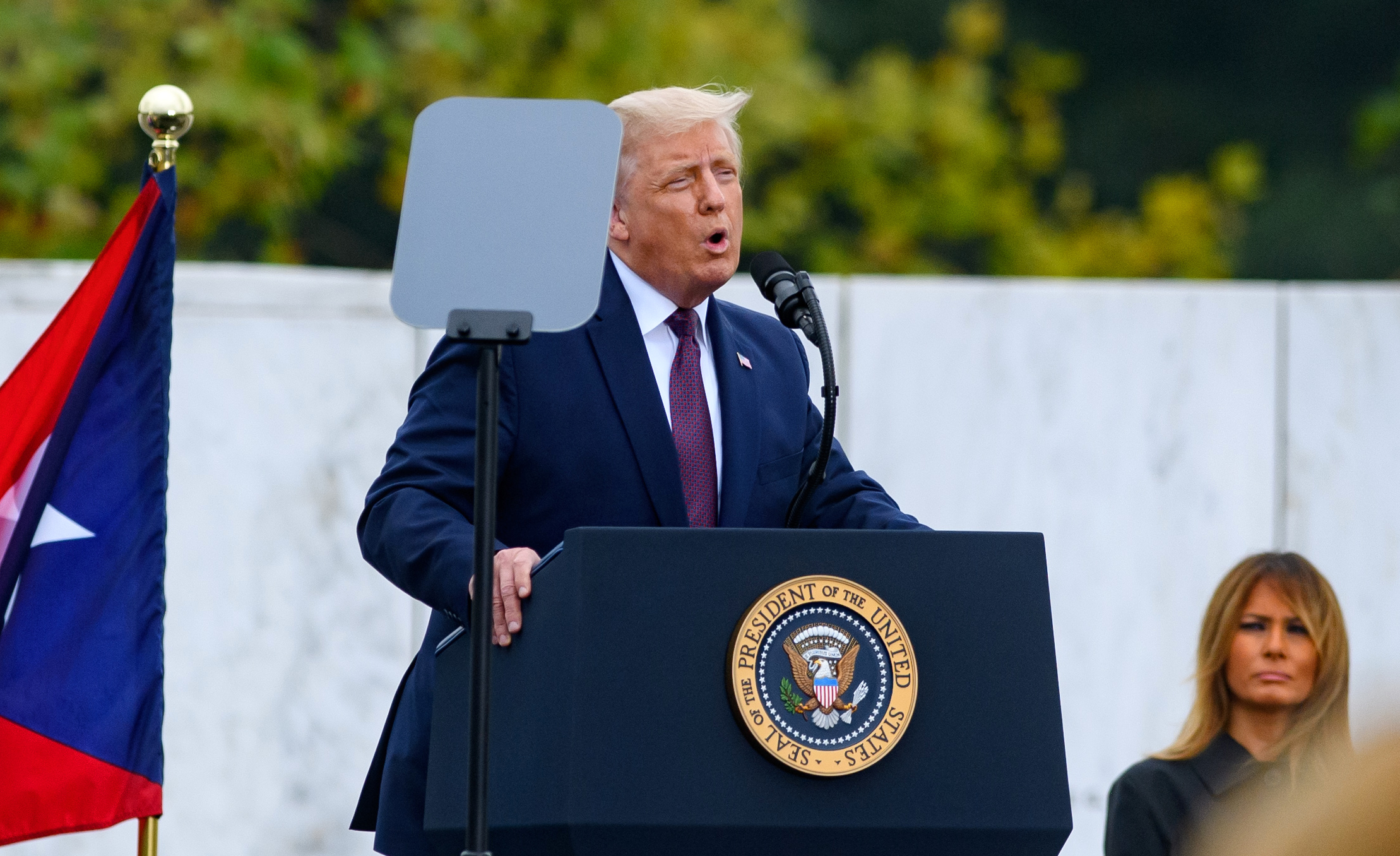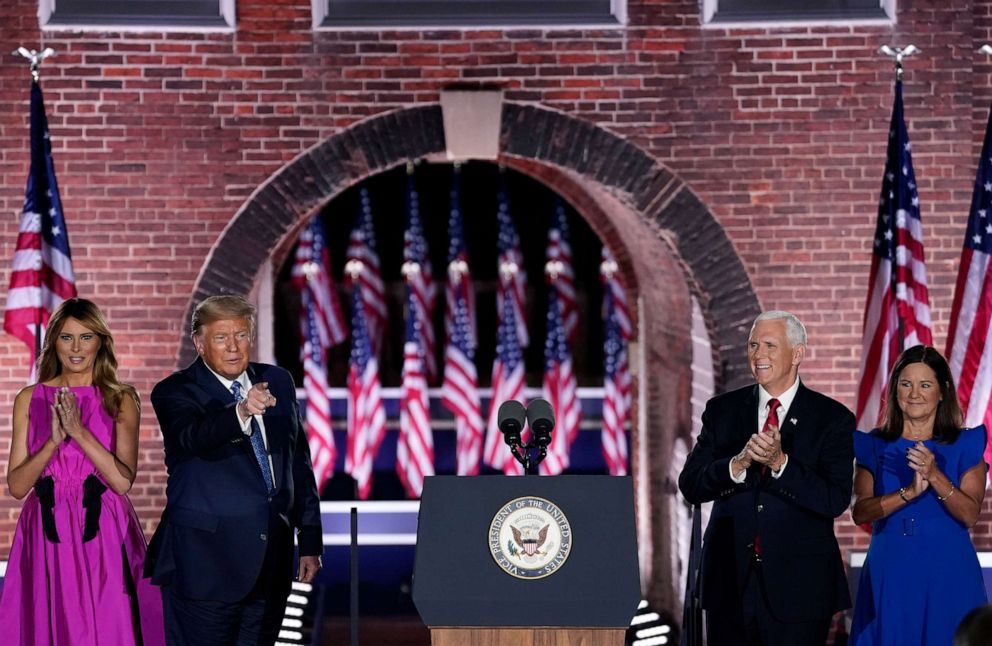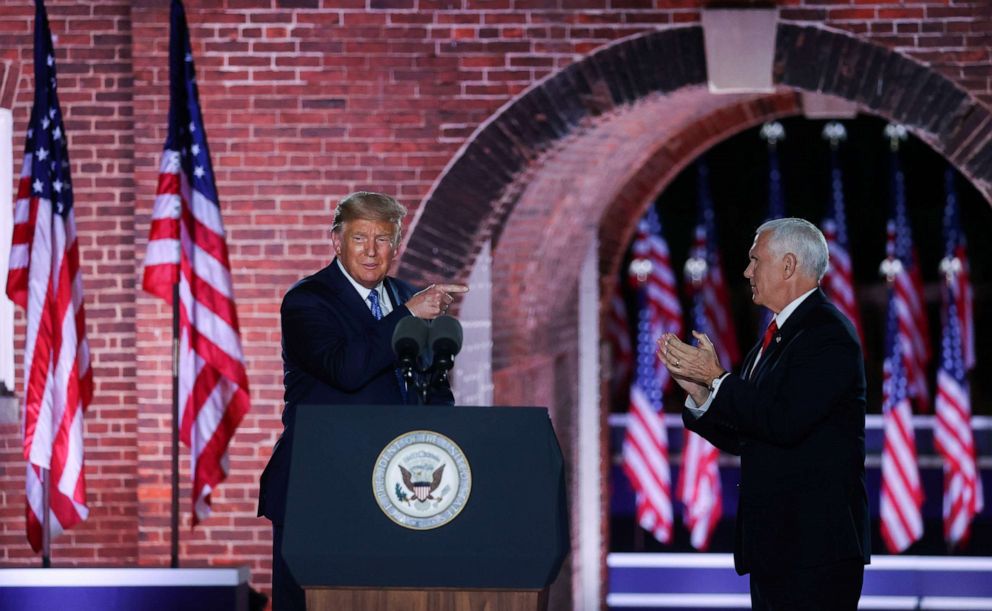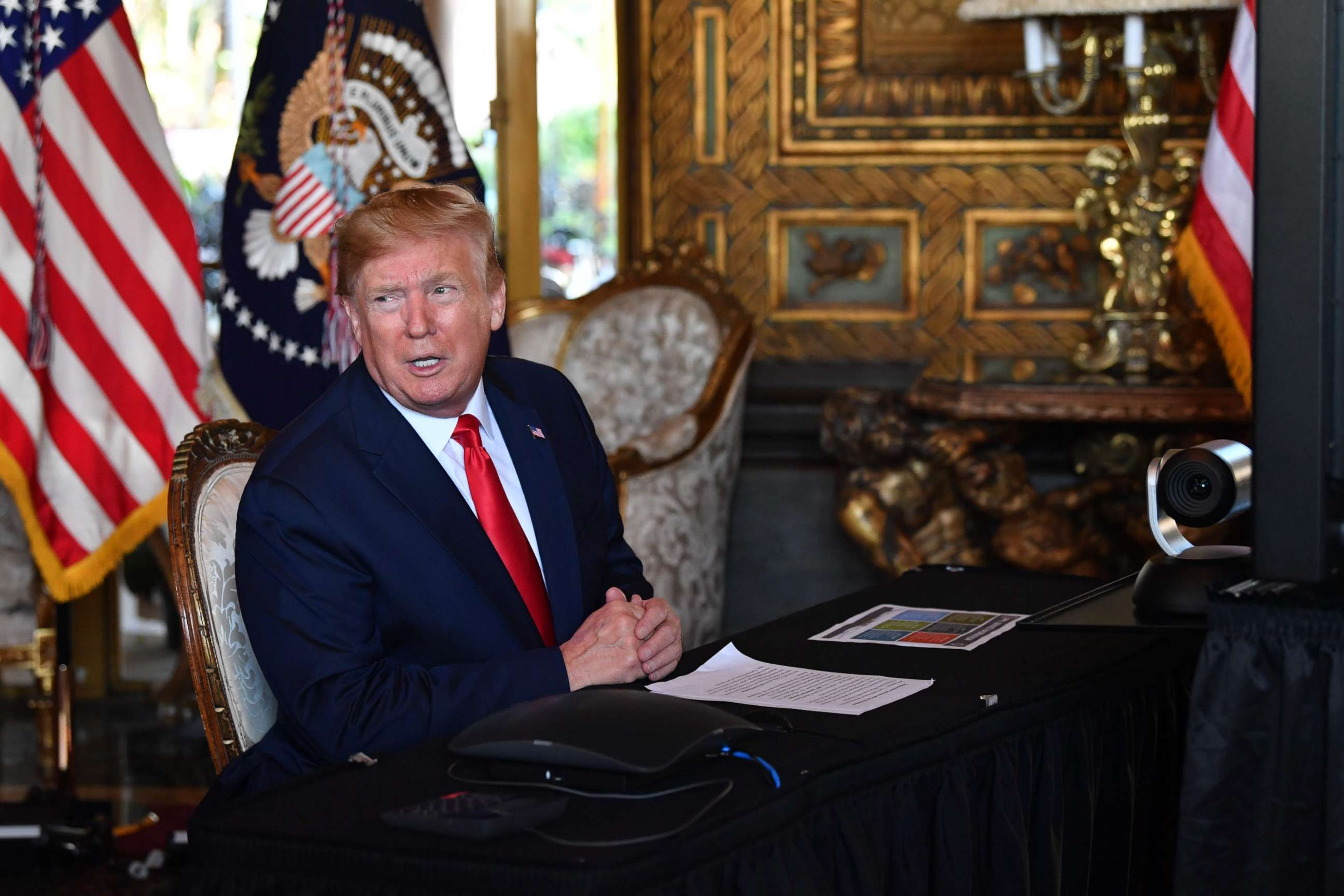Donald Trump: What you need to know about the Republican nominee for president
Trump is the first modern president to run after being impeached.
Donald Trump, the 45th president of the United States, crashed onto the political scene in 2015 after years of speculation about a run for the highest office in the land. The tough-talking New York real estate mogul and reality TV star obliterated the field of Republican challengers in the primary, upended what was projected to be a relatively comfortable victory for Hillary Clinton and as an outsider relished overturning the norms of presidential politics at virtually every turn (to praise and much criticism).
Trump garnered an unflinchingly loyal base of supporters with his appeal to the "forgotten" (largely the white working class) or "deplorables" and massive Make America Great Again rallies, eschewing political correctness, taking aim at his enemies and unapologetically saying he would put America first -- a marked contrast to the political establishment on both sides of the aisle. With former Indiana governor Mike Pence at his side -- an unflinching ally throughout his term -- Trump secured the Evangelical Christian voting bloc, despite myriad controversies that might have made him less appealing to that group.
Trump's approach created instant fame and controversy, with critics saying he benefitted by stoking racial and ethnic fears, but the booming economy and stock market buoyed him among supporters, and even some detractors.
Trump becomes the first president to be his party's nominee after being impeached and spent his entire presidency fending off accusations of impropriety. First, there was the Mueller investigation into his campaign's possible collusion with Russia in 2016, which was not substantiated, but investigators did find evidence of obstruction of justice. Later, Trump was accused of asking Ukraine to help him get dirt on Joe Biden and his son Hunter. The second led to his impeachment in 2019, although he was later acquitted by the Republican-led Senate on slim margins and remained in office.
Trump's reelection prospects have been flipped upside down as the country faces three national crises that have shaped the 2020 election, including a still-raging coronavirus pandemic, the devastating economic fallout from the pandemic and widespread protests calling for racial justice. The pandemic remains a thorny issue for the president, with most Americans throughout the year disapproving of his handling of the virus.
Name: Donald John Trump
Party: Republican
Date of birth: June 14, 1946
Age: 74
Hometown: Queens, New York
Family: Married to Melania Trump, father to Donald Trump Jr., Ivanka Trump, Eric Trump, Tiffany Trump and Barron Trump. Previously was married to Ivana Zelníčková & Marla Maples.
Education: After graduating from the New York Military Academy, Trump attended college for two years at Fordham University in the Bronx before transferring to the Wharton School of Business at the University of Pennsylvania, which then had one of the only real estate programs in American academia. He graduated in 1968 with a bachelor of science degree in economics.

What he used to do: Trump joined his father, Fred, in the New York real estate and development world after college and worked in the field for decades, serving as the chairman and president of the Trump Organization from 1971 until he became president. In recent years, he gained fame as a reality TV star, portraying a larger-than-life version of himself.
Key life/career moments:
Trump burst onto the New York social scene in the 1980s with his opulent lifestyle, hard-charging TV-ready persona and tabloid-ready personal life, but he reached mainstream stardom thanks to the success of his 2004 hit reality TV show "The Apprentice," which was later reimagined as "The Celebrity Apprentice." Trump's TV stardom not only garnered him fame, but fortune as well.
Controversy has followed Trump throughout his professional and personal life.
Shortly after joining his family's New York City real estate business, the Justice Department filed a housing discrimination suit against Donald Trump, his father and their real estate management corporation in 1973. The suit against the Trump management corporation alleged "discriminating against black persons in the operation of their buildings," according to the DOJ. In spite of Trump's battle to have the suit dismissed, his legal team reached an agreement with the government in June 1975 that admitted no "violation of the prohibition against discrimination."
Trump's legacy in business, in part, centers around his ability to market his own name. As he moved from being strictly a real estate developer into a reality television star, he feverishly worked to turn his name into a brand. He licensed Trump products including steaks, water, vodka, menswear and more. He also launched Trump University, a now-defunct for-profit series of courses about real estate and entrepreneurship that also pushed people to buy Trump's books. In 2018, a federal judge in the Southern District of California finalized a $25 million settlement to be paid to Trump University attendees after they alleged fraud.
Trump University claimed its courses would teach attendees Trump's secrets to success in real estate, but the plaintiffs accused the for-profit school of false advertising. Trump University agreed to settle the claims for $21 million, plus another $4 million for the New York Attorney General's office within weeks of Trump becoming president.

Trump, who has been asked about his political ambitions since the '80s, emerged on the political scene in the early 2010s by promulgating and becoming the face of the discredited "birther" movement, which pushed a conspiracy theory over the veracity of former President Barack Obama's birth certificate. And despite Obama releasing his long-form birth certificate in April 2011, Trump continued to call for the release of additional personal documents, offering Obama a check for $5 million to the charity of his choice in return for the release of his college transcripts and passport records.
Trump only conceded that Obama was born in the U.S. in September 2016.
At least 18, women have come forward accusing Trump of varying degrees of inappropriate behavior, including allegations of sexual harassment or sexual assault, all but one before or during his bid for the White House. The president has repeatedly denied all the accusations. Earlier this month, Amy Dorris, a former model, claimed that Trump forcibly kissed and groped her at the U.S. Open tennis tournament in 1997. Legal advisor to the Trump campaign Jenna Ellis called the most recent allegation false and said "this is just another pathetic attempt to attack President Trump right before the election."
Trump became the first U.S. president to step inside North Korea in June 2019 and he was greeted in the Demilitarized Zone (DMZ) by the country's leader, Kim Jong Un. Prior to that historic moment, he'd held two summits with Kim, first in Singapore and then in Vietnam. However, after months of stalled nuclear negotiations and rhetoric returning to hostile levels, North Korea promised to deliver a "Christmas gift" to the U.S. -- a warning that had American and South Korean officials on high alert for a potential long-range missile test at the end of 2019. Such a test would have represented a step back in Trump's diplomatic efforts to end the rouge nation's nuclear weapons program. Nothing appears to have come of that warning. The president has expressed an openness to a third summit, but talks appear to be dead after working-level negotiators met once in October 2019 and were deadlocked. Trump continues to tout his relationship with Kim and tell his supporters, as recently as September, "we were supposed to be at war with them."
The president appointed two conservative judges to the Supreme Court, Justices Neil Gorsuch and Brett Kavanaugh. Following the death of Justice Ruth Bader Ginsburg in September 2020, he has made a third nomination -- federal Judge Amy Coney Barrett -- and is working with Senate Majority Leader Mitch McConnell to try to approve his nominee before Election Day.
Where he stands on some of the issues:
While he was elected with no political experience, the American people now have his four years in office to weigh.
Trump ran and was elected in 2016 on a far-right agenda, especially pertaining to immigration, calling for not only a wall to be built on the southern border, but also a "total and complete" ban on Muslims entering the United States. He entertained the idea of legalizing undocumented youth who are covered under Deferred Action for Childhood Arrivals (DACA) program, but the plan was scrapped and his administration has since sought to end their protections.
Last month, the Trump administration announced it had completed 300 miles of barriers along the southern border. Most of the barrier work has involved renovating and replacing smaller fencing and outdated designs. The president has repeatedly pledged to construct 450 miles by the end of 2020. But so far, fewer than 12 miles of barriers have been built where none previously existed, according to the U.S. Army Corps of Engineers. Officials with Customs and Border Protection have praised the replacement projects while activists in border communities continue to decry the lasting environmental impacts of construction. Trump's hard-line approach to immigration has been consistent with how he campaigned. The president sparked outrage in the summer of 2017 after his administration launched a "zero-tolerance" policy which led to the separation of thousands of migrant families. The president worked to dramatically cut down on the number of refugees taken in by the U.S., signing off on a limit to no more than 18,000 in the fiscal year 2020.

The coronavirus pandemic has brought into question the president's ability to handle a crisis of this proportion. He named Vice President Mike Pence the head of the coronavirus task force and the president is campaigning on the job that he and his administration have done -- from their initial response to the ongoing containment efforts. Even as the U.S. surpassed the grim milestone of 200,000 reported deaths related to COVID-19, he continued to minimize the severity of the pandemic.
Months after reportedly admitting to journalist Bob Woodward that he was intentionally "playing it down" in order to avoid "panic," Trump has bucked public health experts' warnings about the virus at an increasing clip, repeating false and misleading statements about the pandemic and holding crowded campaign rallies with many in attendance not wearing masks. He gave himself an "A+" for handling the virus and said his administration did a "phenomenal job." Trump often repeats that had he not placed travel restrictions on China early on that there would have been upwards of 2 million deaths.
Trump in 2016 promised to bring manufacturing jobs back to the United States and get rid of the North American Free Trade Agreement. While he did replace NAFTA with the United States-Mexico-Canada Agreement (USCMA), the economy, considered one of Trump's strongest selling points, has been in a downward spiral since the coronavirus pandemic forced broad lockdowns. U.S. employers added 1.4 million jobs in August and the unemployment rate fell to 8.4%, the Bureau of Labor Statistics said in its latest employment report earlier this month, but the unemployment rate still isn't anywhere near pre-pandemic levels. In February, the unemployment rate was 3.5%. The unemployment rate is now lower than 10%, the high seen during the Great Recession, for the first time since the pandemic started.
The president is campaigning on a message of "law and order" amid nationwide protests prompted by incidents including the death of George Floyd while in police custody and the shooting of Jacob Blake by a police officer. The president said in Atlanta this month that "our nation has grieved for the tragic deaths," adding, "but we can never allow mob rule. To have safety, to have prosperity, to have everything that you want to have we must always ensure the rule of law."
The president however has largely avoided talking about the racial injustices which are at the root of these issues and why many are protesting across the country. He also has stoked racial fears by suggesting that Democrats will "destroy" the suburbs by allowing crime to flourish and low-income housing.
He has also flexed his muscle by using federal agents or offering to send them into cities to quell protests. In Portland, Oregon, for example, federal agents from Customs and Border Protection were deployed to a federal courthouse, along with the Federal Protective Service, where people have been protesting police violence. Amid unrest and public outcry over clashes between individuals and law enforcement, the governor announced a "phased withdrawal" of federal officers at the end of July. Earlier this summer, peaceful protesters were forcibly removed from Lafayette Square, near the White House, before the president walked over to St. John's Church to take photos while holding a Bible.
Fundraising:
Trump's reelection campaign, the Republican National Committee and their two joint fundraising vehicles have touted a prolific fundraising prowess throughout the 2020 election cycle, together amassing a whopping $1.3 billion just from January 2019 through the end of August this year. They have already surpassed the $1 billion goal they had set for the election cycle.
Much of that fundraising advantage has disappeared in recent months, however, as Team Trump burned through more than $800 million of that through the end of July and was outraised by the Biden campaign and the Democrats by more than $150 million during the month of August. Last month, Trump brought in just $210 million compared to Biden's $364 million record fundraising.
Neither of the campaigns released their cash on hand by the end of August, but this potentially puts Trump's war chest lighter than Biden's as they enter the last two months of the election cycle, as the two campaigns had roughly the same amount of cash on hand going into August.
Trump still does have support from political action committees, including the recently organized Preserve America, which is backed by GOP megadonors.
What you might not know about him:
Trump is the first billionaire U.S. president, with a net worth estimated at $2.5 billion as of September, according to Forbes.
He is the first president to be his party's nominee after being impeached by the House of Representatives. A sharply divided Senate acquitted Trump on both articles of impeachment, with Sen. Mitt Romney as the only Republican to break ranks and become the first senator ever to cast a guilty vote for a president from his own party.
Trump's family is not entirely new to the realm of politics: His older sister, Maryanne Trump Barry, served as a federal judge for the U.S. Court of Appeals for the 3rd Circuit. She was appointed on Sept. 22, 1999 by President Bill Clinton and served until June 30, 2011. The siblings' relationship has been strained.
Earlier this summer, in audio shared with The Washington Post, Barry describes her brother as having "no principles," and alleged that "he doesn't read" and had someone take his college entrance exams on his behalf. "Every day it’s something else, who cares," Trump said in a tweet following the revelations from the tapes. Barry also did not attend the funeral service in August at the White House for their brother, Robert Trump. His niece, Mary Trump, also attacked his character roundly in a new book.

During the 2000 presidential primaries, Trump made an effort to receive the nomination of the Reform Party. Joining the party on Oct. 25, 1999, Trump initially presented himself as an alternative to the front-runner, Pat Buchanan. Confident in his chances in winning both the primary and the general election, Trump entered the California primary, receiving 15,311 votes. He later withdrew his candidacy, expressing concerns over the state of the Reform Party.
He was also once a member of the Democratic Party and even donated hundreds of thousands of dollars to Democrats, including his 2016 rival Hillary Clinton and Sen. Kamala Harris, the Democratic nominee for vice president. The president donated a total of $6,000 from contributions in 2011 and 2013 according to the FEC.
In an unprecedented move, he filed for reelection on the day of his inauguration in January 2017. Since then, Trump, working with the Republican National Committee, has amassed a more traditional and sophisticated reelection team than the successful effort that beat the odds in 2016.
ABC News' Justin Gomez, Quinn Owen, Soorin Kim, Terrance Smith, Conor Finnegan, Conor Kelly and Anne Flaherty contributed to this report.




